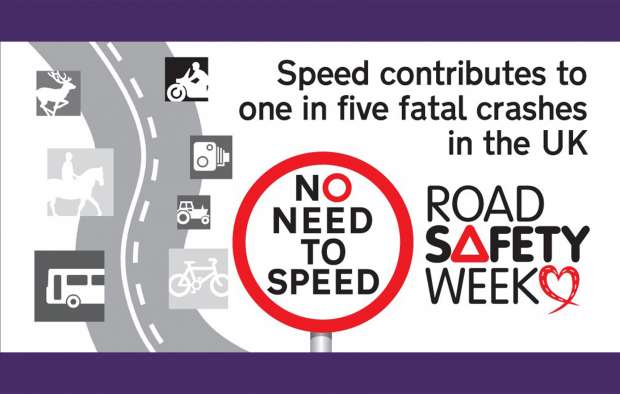
- Home
- News
- Road Traffic
- Road Safety Week: Focus on Speed

Road Safety Week: Focus on Speed
This year, Road Safety Week will focus on driving speed.
The annual awareness campaign is headed by Brake – a road safety charity – and orchestrated in the hope of improving driver behaviour and educating them on the dangers of the road.
Lockdown restrictions meant more open, traffic-free roads on which drivers were tempted to speed. This was highlighted by an increase in speeds to above average in all speed zones and a recorded speed of 151mph on one London road.
This, at a time when the emergency services needed to keep their availability for the global pandemic, was not only selfish, but the risks to a driver while driving at speed remain the same no matter how much traffic there is.
It is important to think that speed is always a contributory factor to a road crash. Whether or not a vehicle is judged to have been speeding, the fact it was involved in a collision means it was going too fast to have stopped in time.
As we try to make it safely through another phase of lockdown, the message continues to be an important one; there is no need to speed.
Winns decided to highlight some key speeding facts, provided by Brake, to remind us all of the potentially devastating impact of driving at speed:
- Road crashes are the biggest killer of young people worldwide and more than six children are seriously hurt or killed every single day on British roads.
- The faster a vehicle is travelling, the longer it will take to stop. At higher speeds, a driver has less time to react if a child steps out in front of them. They are more likely to hit that child and will hit them harder. Speed and stopping distances don’t increase at the same rate. Small increases in speed result in bigger increases in stopping distances.
- The risk of injury increases exponentially with impact speed. A crash at 30mph involves twice as much energy and destructive potential as a crash at 20mph.
- Every year, driver speed contributes to:
- More than 75,000 crashes
- Around 1,500 deaths
- Almost 20,000 serious injuries
- Almost a quarter of fatal crashes
What are the keys things to remember and pass on to other drivers?
Slower is safer
The faster we drive, the greater our risk of crashing and the harder we hit something, or someone, if we crash. A crash at 30mph has twice the energy and destructive potential of a crash at 20mph.
Shorter stopping distances
The faster a vehicle is travelling, the longer it takes to stop. At higher speeds, a driver has less time to react and stop in time in an emergency.
Limits not targets
The speed limit is the top speed for any particular road, but it is often safer to travel at much lower speeds, especially in places where people walk and cycle.
Safe speeds save lives
We might say it’s ok to speed because everyone else is doing it. But if we all drive too fast, we collectively increase the risk of crashes on our roads, and we increase the risk of someone that we love being involved in a crash.
Speeding is an absolute focus as it is the most prominent cause of fatal and serious crashes. Currently, speeding is not socially unacceptable and speeding drivers go unchecked. We need to change this. The public must challenge their family, friends and themselves not to speed and by making speeding socially unacceptable influence genuine change in driving behaviour and standards.
Detective Superintendent Andy Cox, the Met Police’s lead for Vision Zero
Take the opportunity to use this Road Safety Week to remind your driving friends and family of the dangers of driving at speed.
----------------------------
Find out more at: roadsafetyweek.org.uk
And follow Winns social media for daily updates during Road Safety Week:
Twitter Facebook Instagram LinkedIn
Share this article
Would you know what to do if you had a non-fault accident?
Existing Client?
Keep on top of your claim 24/7, 365 days a year with Touchpoint, accessible from any internet-enabled device.



